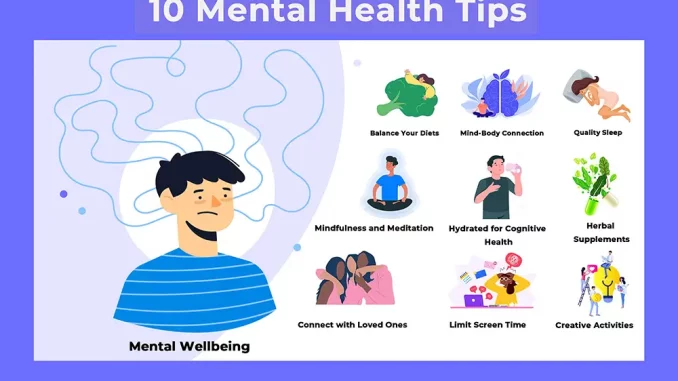
Mental health is an essential aspect of overall well-being, yet it’s often overlooked in our busy lives. As we enter 2025, there’s a growing awareness of the importance of mental health and the need for effective ways to improve it. Fortunately, there are many simple, actionable steps that anyone can take to boost their mental well-being. Whether you’re struggling with stress, anxiety, or simply want to live a more balanced life, here are 10 simple ways to improve your mental health this year.
1. Prioritize Self-Care
Self-care is a vital practice for maintaining good mental health. In 2025, people are embracing self-care routines that go beyond occasional bubble baths or face masks. It’s about carving out time for yourself, setting boundaries, and practicing mindfulness. Whether it’s taking a walk in nature, journaling, or meditating, find activities that nurture your mind and body. Consistent self-care helps reduce stress and promotes a sense of control and well-being.
2. Practice Gratitude Daily
Gratitude has a powerful impact on mental health. Studies have shown that practicing gratitude can significantly reduce symptoms of depression and anxiety. By simply acknowledging the positive aspects of your life each day, you can shift your mindset toward more optimism. In 2025, consider keeping a gratitude journal and jotting down three things you’re grateful for each day. This small practice can boost your mood and help you appreciate the present moment.
3. Stay Physically Active
Physical activity is not just good for your body—it’s great for your mind, too. Regular exercise releases endorphins, the brain’s feel-good chemicals, which help improve mood and reduce stress. You don’t need to run marathons; even a brisk 20-minute walk every day can make a big difference. Whether it’s yoga, dancing, or hiking, find a physical activity you enjoy and make it a regular part of your routine. In 2025, many people are exploring outdoor activities, fitness apps, and virtual classes to stay fit and improve their mental health.
4. Get Enough Sleep
Sleep is crucial for mental health, yet many people in the U.S. struggle to get enough rest. Lack of sleep can lead to irritability, anxiety, and depression. In 2025, more people are focusing on sleep hygiene—establishing a consistent sleep schedule, reducing screen time before bed, and creating a peaceful environment to improve sleep quality. Aim for 7-9 hours of sleep each night to support cognitive function, emotional regulation, and overall well-being.
5. Connect with Loved Ones
Human connection plays a significant role in maintaining good mental health. Social support is a key factor in reducing feelings of loneliness and stress. Whether it’s family, friends, or a support group, staying connected with loved ones provides emotional security and encourages a sense of belonging. In 2025, many are turning to virtual meetups, video calls, and online communities to stay connected, making it easier to foster relationships regardless of distance.
6. Limit Social Media Usage
While social media can be a fun way to stay connected, excessive use can negatively impact mental health. Studies have shown that prolonged exposure to social media can lead to feelings of inadequacy, anxiety, and depression. In 2025, more individuals are setting boundaries with social media to reduce its harmful effects. Consider limiting your time on social platforms, unfollowing accounts that don’t bring positivity into your life, and taking regular breaks from screens. This simple habit can improve your mental clarity and help you focus on more meaningful activities.
7. Seek Professional Help
If you’re struggling with mental health issues such as depression or anxiety, seeking professional help is one of the best ways to improve your well-being. In 2025, telehealth and virtual therapy have made it easier than ever to access mental health services. Therapy isn’t just for people with diagnosed conditions; it’s also a great resource for anyone looking to manage stress, improve relationships, or gain deeper insight into their emotions. Don’t hesitate to reach out to a mental health professional when you need support.
8. Engage in Creative Hobbies
Engaging in creative activities can be incredibly therapeutic. Whether it’s painting, knitting, cooking, or playing an instrument, expressing yourself through creative outlets helps reduce stress and boosts mental well-being. In 2025, more people are discovering the benefits of hobbies that allow them to unwind and focus on the present moment. These activities can serve as a form of self-expression and provide a sense of accomplishment and relaxation.
9. Practice Mindfulness and Meditation
Mindfulness and meditation are proven techniques for reducing stress and improving mental clarity. In 2025, mindfulness practices are becoming more mainstream, with many apps and online resources offering guided meditation sessions. Regular mindfulness practice helps you stay grounded in the present moment, reducing the tendency to ruminate on the past or worry about the future. Whether it’s a few minutes of deep breathing or a 30-minute meditation session, integrating mindfulness into your daily routine can lead to significant improvements in mental health.
10. Set Realistic Goals
Setting goals is essential for personal growth, but setting unrealistic expectations can lead to frustration and burnout. In 2025, people are focusing on setting realistic, achievable goals that align with their values and mental well-being. Break down large goals into smaller, manageable tasks and celebrate small victories along the way. This helps you stay motivated and reduces the pressure to be perfect. Having a clear sense of direction can give you a sense of purpose and boost your confidence.